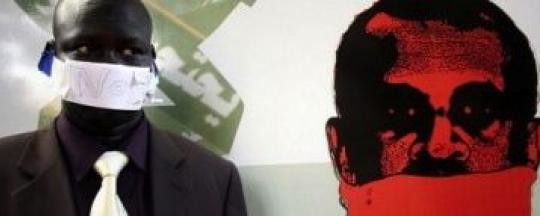The closure of the Catholic radio station Bakhita FM on Saturday is the latest key event in a struggle for control between independent media houses and the South Sudanese government, which has declared its intent to “regulate everything.”
Though the struggle pre-dates the current conflict in the country, it has intensified since the outbreak of fighting in December 2013. Since then, all major independent media houses in the capital Juba have been raided by government security forces.
Journalists have been regularly denied access to hospitals, morgues, IDP camps, and mass grave sites. They have been warned not to quote opposition figures or rebel spokesmen who are in exile, nor to cover political debate on the issue of federalism. They report frequent threats, harassment and periodic arrests.
Below is a timeline of some of the major media events in South Sudan over the last year. Only some of the major incidents are highlighted.
6 November 2013: South Sudan’s information minister says all journalists in the country must be approved and registered by the government and carry a government-issued accreditation card. He declares also the government will ‘regulate everything.’
4 December 2013: Several media houses threaten to shut down rather than comply with the information minister’s directives. The information minister fails to enforce his demand that all journalists carry ID cards issued by his ministry.
December – January 2013: Two radio stations in Bor, capital of Jonglei, suffer extensive damage during fighting and go off air. Two radio stations in Malakal, capital of Upper Nile, also go off air.
December 2013 – January 2014: Government agents arrest two foreign journalists and deport at least three for their coverage of the civil war.
16 January 2014: National security confiscates print run of Juba Monitor.
Early February 2014: Community radio station in Leer, Unity State, is destroyed after government troops capture the town.
5 March 2014: Information Minister Michael Makuei accuses Eye Radio in Juba of “making hostile propaganda” for broadcasting interviews with opposition representatives at peace talks in Addis Ababa and threatens to arrest the station’s journalists. Several staff are taken into questioning and intimidated.
13 March 2014: The National Security Service takes into questioning a journalist of Voice of America’s ‘South Sudan in Focus’ programme, after the station aired a listener comment critical of the government.
10 June 2014: The country’s main Arabic newspaper announces it is shutting down and reopening under new ownership.
June – July 2014: Editors of various media houses defy government orders not to cover debate on the issue of federalism
3 July 2014: National Security confiscates Juba Monitor again.
4 July 2014: A newspaper editor is summoned by the National Security Service to their headquarters but refuses to comply.
16 July 2014: National security service threatens a radio station in Yei.
22 July 2014: South Sudan’s government seeks to silence famine warnings.
Late July 2014: Several journalists in Northern Bahr al Ghazal are threatened for reporting on recent security and political developments in the state.
Late July 2014: Weer Bei FM in Northern Bahr al Ghazal is forcibly closed down for several days.
1 August 2014: Rights groups slam ‘abuses’ against the media by South Sudan’s National Security Service.
16 August 2014: Government shuts down Catholic Radio station Radio Bakhita FM.
For breaking news updates from Radio Tamazuj ‘like’ our page on Facebook, follow us on Twitter, or subscribe to our RSS feed.



